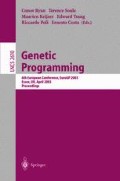Abstract
In this contribution we investigate the influence of different variation effects on the growth of code. A mutation-based variant of linear GP is applied that operates with minimum structural step sizes. Results show that neutral variations are a direct cause for (and not only a result of) the emergence and the growth of intron code. The influence of non-neutral variations has been found to be considerably smaller. Neutral variations turned out to be beneficial by solving two classification problems more successfully.
Access this chapter
Tax calculation will be finalised at checkout
Purchases are for personal use only
Preview
Unable to display preview. Download preview PDF.
References
W. Banzhaf, Genotype-Phenotype-Mapping and Neutral Variation: A Case Study in genetic programming. In Proceedings of the Conference on Parallel Problem Solving from Nature III, pp. 322–332, Springer-Verlag, Berlin, 1994.
W. Banzhaf and W. B. Langdon, Some considerations on the reason for bloat. Genetic Programming and Evolvable Machines, vol. 3(1), 81–91, 2002.
W. Banzhaf, P. Nordin, R. Keller, and F. Francone, Genetic Programming-An Introduction. On the Automatic Evolution of Computer Programs and its Application. dpunkt/Morgan Kaufmann, Heidelberg/San Francisco, 1998.
W. Banzhaf, M. Brameier, M. Stautner, and K. Weinert. Genetic Programming and its Application in Machining Technology. In H.-P. Schwefel et al. (eds.) Advances in Computational Intelligence-Theory and Practice, Springer, Berlin, 2002.
T. Blickle and L. Thiele, Genetic Programming and Redundancy. In J. Hopf(ed.) Genetic Algorithms within the Framework of Evolutionary Computation (Workshop at KI-94), pp. 33–38, Max-Planck-Institut für Informatik, Technical Report No. MPI-I-94-241, 1994.
M. Brameier and W. Banzhaf, A Comparison of Linear Genetic Programming and Neural Networks in Medical Data Mining. IEEE Transactions on Evolutionary Computation, vol. 5(1), pp. 17–26, 2001.
M. Brameier and W. Banzhaf, Explicit Control of Diversity and Effiective Variation Distance in Linear Genetic Programming. In J. A. Foster et al. (eds.) Genetic Programming, Proceedings of the 5th European Conference (EuroGP 2002), pp. 37–49, Springer-Verlag, LNCS, Berlin, 2002.
M. Kimura, The Neutral Theory of Molecular Evolution. Cambridge University Press, 1983.
J. R. Koza, Genetic Programming. MIT Press, Cambridge, MA, 1992.
W. B. Langdon and R. Poli, Fitness Causes Bloat. In P. K. Chawdhry et al. (eds.) Soft Computing in Engineering Design and Manufacturing, pp. 13–22, Springer-Verlag, Berlin, 1997.
W. B. Langdon, T. Soule, R. Poli, and J. A. Foster, The Evolution of Size and Shape. In L. Spector et al. (eds.) Advances in Genetic Programming III, pp. 163–190, MIT Press, Cambridge, MA, 1999.
P. Nordin and W. Banzhaf, Complexity Compression and Evolution. In L. J. Eshelman (ed.) Proceedings of the Sixth International Conference on Genetic Algorithms (ICGA’95), pp. 310–317, Morgan Kaufmann, San Francisco, CA, 1995.
T. Soule and J. A. Foster, Code Size and Depth Flows in Genetic Programming. In J. R. Koza et al. (eds.) Genetic Programming 1997: Proceedings of the Second Annual Conference (GP’97), pp. 313–320, Morgan Kaufmann, San Francisco, CA, 1997.
T. Soule and R. B. Heckendorn, An Analysis od the Causes of Code Growth in Genetic Programming. Genetic Programming and Evolvable Machines, vol. 3(3), pp. 283–309, 2002
T. Soule and J. A. Foster, Removal Bias: A new Cause of Code Growth in Treebased Evolutionary Programming. In Proceedings of the International Conference on Evolutionary Computation (ICEC’98), pp. 781–786, IEEE Press, 1998.
T. Yu and J. Miller, Neutrality and the Evolvability of Boolean Function Landscapes. In J. F. Miller et al. (eds.) Genetic Programming, Proceedings of the 4th European Conference (EuroGP 2001), pp. 204–217, Springer-Verlag, LNCS, Berlin, 2001.
Author information
Authors and Affiliations
Editor information
Editors and Affiliations
Rights and permissions
Copyright information
© 2003 Springer-Verlag Berlin Heidelberg
About this paper
Cite this paper
Brameier, M., Banzhaf, W. (2003). Neutral Variations Cause Bloat in Linear GP. In: Ryan, C., Soule, T., Keijzer, M., Tsang, E., Poli, R., Costa, E. (eds) Genetic Programming. EuroGP 2003. Lecture Notes in Computer Science, vol 2610. Springer, Berlin, Heidelberg. https://doi.org/10.1007/3-540-36599-0_26
Download citation
DOI: https://doi.org/10.1007/3-540-36599-0_26
Published:
Publisher Name: Springer, Berlin, Heidelberg
Print ISBN: 978-3-540-00971-9
Online ISBN: 978-3-540-36599-0
eBook Packages: Springer Book Archive

